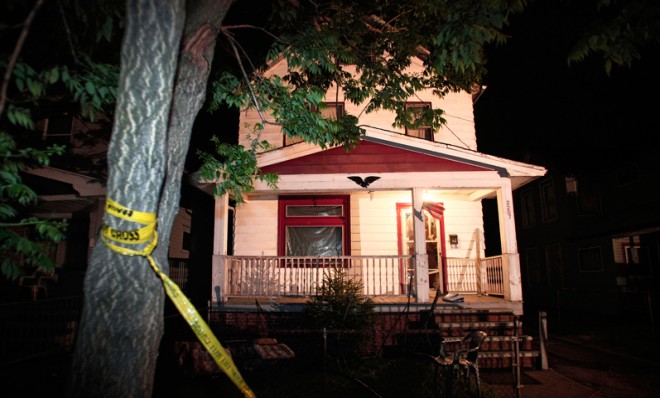Should Cleveland destroy Ariel Castro's house?
Controversy builds over 2207 Seymour Avenue, where three women were allegedly locked up, raped, and beaten for 10 years

A free daily email with the biggest news stories of the day – and the best features from TheWeek.com
You are now subscribed
Your newsletter sign-up was successful
The two-story house at 2207 Seymour Avenue has become a source of controversy for the city of Cleveland. It was there that Ariel Castro, 52, allegedly imprisoned kidnapping victims Amanda Berry, Gina DeJesus, and Michelle Knight for a decade.
Now that Castro has been charged with four counts of kidnapping and three counts of rape, and is in jail on $8 million bond, the question is what to do with the house or horrors he left behind.
The house has been boarded up and is surrounded by a 10-foot fence. It is also under constant surveillance by the Cleveland police. Why, you might ask, does a dilapidated, four-bedroom house need a police escort?
The Week
Escape your echo chamber. Get the facts behind the news, plus analysis from multiple perspectives.

Sign up for The Week's Free Newsletters
From our morning news briefing to a weekly Good News Newsletter, get the best of The Week delivered directly to your inbox.
From our morning news briefing to a weekly Good News Newsletter, get the best of The Week delivered directly to your inbox.
Because at least three people have threatened to burn it down, Cleveland city councilman Brian Cummins told The Daily Beast. And to Cummins, the message is clear: "As a representative of the county, it is my job to understand what the residents want — and this community wants it down."
That isn't going to happen anytime soon, mainly because it's still a crime scene. While FBI investigators have already taken 200 items from the crime scene, the house itself will remain an important piece of evidence until the trial is done.
"The prosecutors are going to want to preserve it so they can take jurors into it to view, and the defense would want it preserved so at least they could do their own investigation," criminal law professor Michael Benza told the Associated Press.
Even after the trial, it's not clear what will happen to the house. The Daily Beast reports that Castro last paid real-estate taxes for the house in 2010, and that it was marked for foreclosure in May. Castro most likely doesn't have the money to pay for the house's demolition, which means Cleveland taxpayers would probably be on the hook for the bill.
A free daily email with the biggest news stories of the day – and the best features from TheWeek.com
If officials leave the house standing, there is no law in Ohio requiring sellers to tell buyers whether a violent crime was committed on the premises.
Neighbor Carla Smith told The Daily Beast that she thinks the city should turn the house into a memorial with a "plaque saying 'Hope for the three girls,' because all they had was hope and prayer."
Most of the neighbors interviewed by reporters, however, seemed to want the place torn down.
"The girls that was in that house, when they ride by there, if they ever ride by there again, they won't have to see that, to remind them or maybe scare them," Castro neighbor Johnny Wright told the Associated Press. "What they went through, I don't think any human being should ever been through that."
Keith Wagstaff is a staff writer at TheWeek.com covering politics and current events. He has previously written for such publications as TIME, Details, VICE, and the Village Voice.
-
 Political cartoons for February 16
Political cartoons for February 16Cartoons Monday’s political cartoons include President's Day, a valentine from the Epstein files, and more
-
 Regent Hong Kong: a tranquil haven with a prime waterfront spot
Regent Hong Kong: a tranquil haven with a prime waterfront spotThe Week Recommends The trendy hotel recently underwent an extensive two-year revamp
-
 The problem with diagnosing profound autism
The problem with diagnosing profound autismThe Explainer Experts are reconsidering the idea of autism as a spectrum, which could impact diagnoses and policy making for the condition